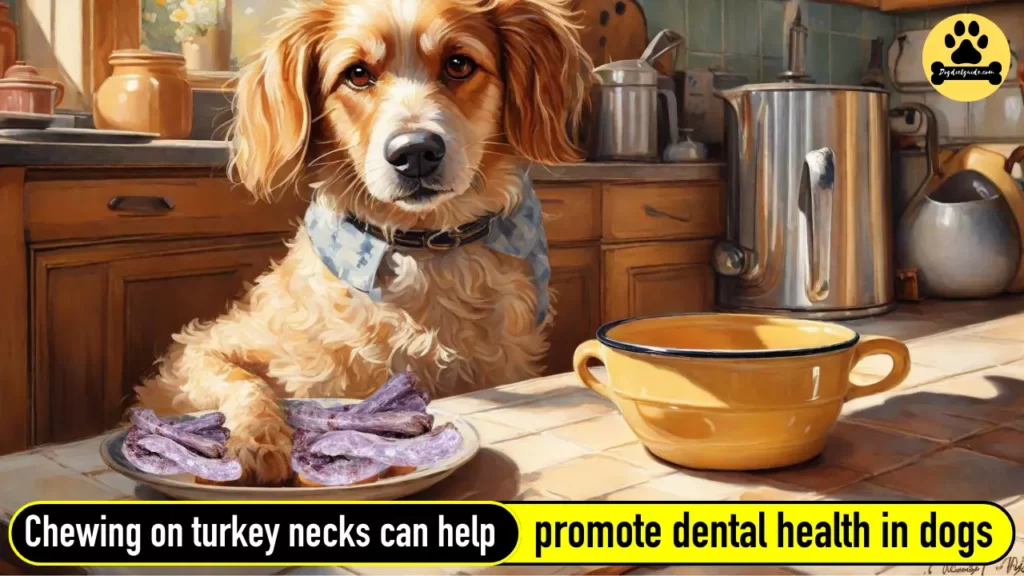As devoted pet owners, we often contemplate the dietary choices contributing to our canine companions’ well-being. Amidst the array of potential treats and table scraps, the question of whether dogs can safely consume turkey necks arises.
It’s a common query, especially during holiday feasts when these succulent, flavorful necks are abundant. So, can dogs eat turkey necks?
Turkey necks are a rich source of high-quality protein for dogs.
Rich in protein, raw or dehydrated turkey necks provide essential amino acids contributing to muscle development and overall dog health. Turkey necks for dogs contain important vitamins and minerals such as B vitamins, zinc, and iron, promoting a shiny coat, strong bones, and a robust immune system.
In this comprehensive guide, we’ll delve into the myths and facts surrounding dogs’ consumption of turkey necks, exploring the nutritional benefits, potential risks, and dos and don’ts.
Can Dogs Eat Turkey Necks?
Yes, dogs can eat turkey necks, which provide health benefits to your puppy due to their rich protein and essential nutrient content. However, turkey necks should only be fed raw or air-dried, as bones cooked at high temperatures are more likely to splinter and cause injury to your dog’s mouth and gut.
Additionally, you should remove the skin and seasonings. Feed in moderation and monitor your dog while they are chewing on bones.

Benefits of Turkey Necks For Dogs
Turkey necks can benefit dogs when included in a balanced and appropriate diet.
- Turkey’s necks are a good source of high-quality protein, essential for maintaining and repairing tissues, muscle development, and overall growth of canines.
- Turkey’s necks contain essential nutrients such as vitamins (B vitamins, vitamin K), minerals (phosphorus, zinc, selenium), and amino acids that contribute to a pup’s overall health and well-being.
- Chewing on turkey necks can help promote dental health in dogs by reducing plaque and tartar buildup. Chewing also exercises the jaw muscles.
- The cartilage and connective tissue in turkey necks may contribute to joint health, supporting dogs, especially as they age.

Risks of Feeding Dogs Turkey Necks
- Inappropriate turkey necks sizing can pose a choking risk.
- Cooked bones may splinter, causing internal injuries.
- Raw turkey necks can carry bacteria like Salmonella.
- Overconsumption may lead to upset stomach or constipation.
- Some dogs may be allergic to proteins in turkey necks.
- High-fat content in the skin can contribute to pancreatitis.

Related Post: Can Dogs Eat Turkey Feet?
Moderation is Key
Moderation is key to any treat or addition to your dog’s diet. While turkey necks can be a fantastic source of nutrients, overfeeding can lead to health issues such as obesity or digestive upset.
Consider your dog’s size, age, and overall health when incorporating turkey necks into their meals, and always consult with your veterinarian if you have any concerns.
Guidelines for Feeding Dogs Turkey Necks
To ensure the safety of feeding your dog turkey necks, follow these preparation tips:
- Fed Raw or Air-Dried:
- Turkey necks should only be fed raw or air-dried, as bones cooked at high temperatures are more likely to splinter and cause injury to your dog’s mouth and gut. Avoid seasoning the meat with ingredients like garlic or onions, which can be toxic to dogs.
- Supervision:
- When introducing turkey necks, supervise your furry friend to observe their chewing behavior. This allows you to intervene if any issues arise.
- Size Matters:
- Choose turkey necks that are appropriate in size for your pup’s breed and chewing capabilities. This helps prevent choking hazards.
- Storage:
- Store and refrigerate turkey necks to prevent spoilage and bacterial growth.
Precautions When Giving Dogs Turkey Necks
- Monitor for choking or blockage risks, especially if your dog swallows’ large pieces.
- Never leave your furry friend unattended while they’re chewing on a turkey neck.
- Consider your dog’s size and health for appropriate portions to prevent digestive issues.
- Offer turkey necks as an occasional treat, not a regular part of the diet.
- Avoid using seasonings, marinades, or additives; stick to plain, cooked turkey.
- Watch for potential allergic reactions and start with small amounts of introducing turkey necks for the first time.
- Seek advice from your vet, especially if your puppy has health conditions or dietary restrictions.
Related Post: Are Turkey Hearts Safe for Dogs?
Dog-Safe Turkey Neck Recipes
Raw Turkey Neck:
- Ingredients:
- Fresh, raw turkey necks (make sure they are from a reliable source)
- Optional: Add fresh vegetables for added nutrients, such as carrots or leafy greens.
- Instructions:
- Preparation:
- Wash the raw turkey necks thoroughly under cold running water.
- If desired, chop or blend some vegetables to mix with the turkey necks. Vegetables should be dog-safe and not include onions, garlic, or other toxic ingredients.
- Preparation:
- Portioning:
- Depending on your dog’s size, you can serve the whole turkey neck or portion it into smaller pieces.
- Serving:
- Place the raw turkey necks and any optional vegetables in your dog’s bowl.
- Supervision:
- Always supervise your dog while eating raw food to prevent choking or other issues.
Air-Dried Turkey Neck:
- Ingredients:
- Air-dried turkey necks (commercially prepared or homemade)
- Instructions:
- Purchase or Prepare:
- You can purchase commercially prepared air-dried turkey necks from a reputable pet food brand, ensuring that they are made specifically for dogs.
- Alternatively, if you have access to an air dehydrator, you can prepare your own air-dried turkey necks by dehydrating them at a low temperature until thoroughly drying.
- Purchase or Prepare:
- Serving:
- Place the air-dried turkey necks in your dog’s bowl.
- Storage:
- Store any unused air-dried turkey necks in an airtight container in a cool, dry place.
Final Thoughts: Can Dogs Eat Turkey Necks?
In conclusion, whether dogs can eat turkey necks can be answered with a resounding “yes,” as long as it’s done responsibly. Understanding the nutritional benefits, potential risks, and best practices for preparation is essential for providing a healthy and enjoyable treat for your canine companion.
By incorporating turkey necks into your dog’s diet in moderation and with proper precautions, you can contribute to their overall well-being and happiness.
Always prioritize your dog’s safety and consult your veterinarian for personalized advice based on your pet’s needs.
” It is essential to emphasize that while we offer valuable insights, we do not intend to replace or undermine the importance of your veterinarian’s advice. The information presented on our site is purely for informational and educational purposes.”

I’m JK. A pet lover who has years of pet blogging experience. I thought it would be a great idea to share my experience with all dog owners so they can also keep their canine companions healthy and happy.






